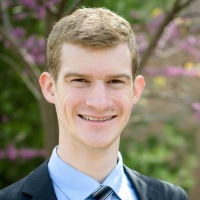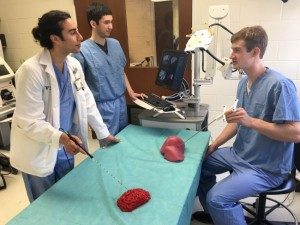Patrick Anderson, a VISE affiliate, earns NSF Graduate Research Fellowship
 The National Science Foundation recently selected 14 Vanderbilt graduate students to receive Graduate Research Fellowships. Vanderbilt Institute for Surgery and Engineering (VISE) is proud to announce Patrick Anderson, a VISE affiliate and mechanical engineering doctoral student, is among those awarded this prestigious honor.
The National Science Foundation recently selected 14 Vanderbilt graduate students to receive Graduate Research Fellowships. Vanderbilt Institute for Surgery and Engineering (VISE) is proud to announce Patrick Anderson, a VISE affiliate and mechanical engineering doctoral student, is among those awarded this prestigious honor.
Highly sought after because they provide recipients with three years of support, the NSF fellowships include a $34,000 annual stipend and a $12,000 cost-of-education allowance that goes to the university. The fellowship allows recipients the freedom to choose the U.S. institution of graduate education where they will conduct research and profession development.
Anderson works under the supervision of Robert Webster, associate professor of mechanical engineering, in the Medical Engineering and Discovery Lab.
“The NSF Fellowship is one of the most prestigious awards a doctoral student can win. Patrick won this award based on his idea for a revolutionary new device with the potential to save the lives of people with lung cancer, and for his innovative work to bring his research into high school classrooms to inspire the next generation of scientist and engineers.”
“We are fortunate to have Patrick at Vanderbilt, and look forward to the amazing things he will do with his fellowship and throughout his career,” said Webster, VISE steering committee member.
 Anderson was part of the first cohort to take part in a novel NIH-funded T32 training grant centered on VISE training domains, and he is also a veteran of the VISE-sponsored Vanderbilt IMPACT (which stands for Initiating, Maximizing, Promoting, and Accelerating Commercialization and Translation) course in which students explore medical device entrepreneurship.
Anderson was part of the first cohort to take part in a novel NIH-funded T32 training grant centered on VISE training domains, and he is also a veteran of the VISE-sponsored Vanderbilt IMPACT (which stands for Initiating, Maximizing, Promoting, and Accelerating Commercialization and Translation) course in which students explore medical device entrepreneurship.
According to the NSF, this unique program “has nurtured economic innovation and leadership in the U.S… by recruiting and supporting outstanding students with high potential in science, technology, engineering and mathematics very early in their graduate training.”
